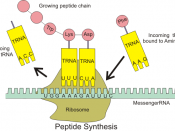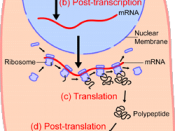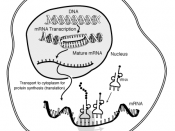Describe the role of DNA in protein synthesis
DNA is found in the cells nucleus. It is part of the chromosome of the cell. DNA is the molecule that controls the making of protein. Protein is used for the growth of cells and organisms and also for the repair of cells. Protein is also used as an enzyme to speed up reactions in the body. Because of this DNA is able to control the whole organism. With out DNA and its ability to make protein the cells and eventually the whole organism would die because it would not be able to reproduce protein. Protein is made out of a long chain of amino acids. It is made in cytoplasm of the cells.
Protein synthesis is dependant of the DNA being properly decoded. To start the process of protein synthesis a section of the DNA " unzips " exposes the base sequence on the decoding strand.
However, DNA is too large a molecule to pass through the nucleus wall into the cytoplasm where the protein is made. This means that the DNA has to be copied and transported through into the cytoplasm. This is done by messenger RNA.
Once the DNA has unzipped messenger RNA (mRNA) from the cytoplasm comes into the nucleus and attaches itself to the DNA. Whilst doing this it makes sure that the organic bases match up: adenine to uracil and guanine to cytosine. This is in accordance to the rules of organic base pairing. Once the mRNA has copied the DNA it floats of into the cytoplasm through the nuclear pores. This process is called transcription.
Once the mRNA has passed through to the cytoplasm it attaches its self onto a ribosome or rRNA. This is the RNA that allows the mRNA to be...



Interesting
Good work..used easy language,easy to understand.
0 out of 0 people found this comment useful.